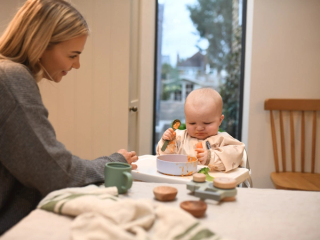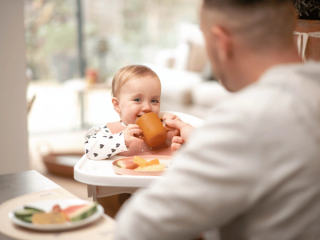
- Home
- Advice Hub
- Baby
- Weaning
- Understanding Food Groups
Understanding food groups
A baby’s diet doesn’t need to be complicated. There are a few basic principles to follow and some important nutrients. Learn about how to balance the four main food groups in your little one's diet.
A baby’s diet doesn’t need to be complicated. There are a few basic principles to follow and some important nutrients [you can read more on those HERE]. But if you’re offering a balance of the four main food groups set out below, you’ll be well on your way to a good balanced diet for your baby.
Try to always remember that food is about so much more than nutrition. Weaning is a huge learning curve for your baby – they are learning how to physically eat, how food fits in with your family, and are laying down their eating habits for the future. Food is as much about togetherness, family, love and connection as it is about the vitamins and minerals that your baby is getting.
What should the diet look like?
Once your baby has completed a week or so of green vegetables and you have given some first single tastes for a few days, it’s time to start thinking about including different food groups. This will ensure that your baby is getting a mix of different vitamins and minerals each day as well as a range of colours, flavours and textures.
Mixing food groups is something we tend to do instinctively for ourselves without thinking about it. For example, you probably put Bolognese sauce onto pasta and then grate a little cheese on top. Or you make a sandwich with some cheese or ham inside – in other words you wouldn’t usually sit down to a single food like pasta or bread for a meal. We shouldn’t be doing that for our babies either.
When we talk about ‘mixing’ food groups this doesn’t mean all the foods have to physically be mixed together. It’s good to continue offering flavours in different ways; mixed with other foods to make new flavour combinations and also on their own, so that your baby continues to recognise that food as something they enjoy.
What are the different food groups?
Protein
- Meat, fish, eggs, beans, lentils, nut butters, etc
- From 6-12 months these should be given 1-2 times daily. If you are vegetarian this increases to 2-3 times.
Some good options from our range that include protein are our Vegetables with Rice and Chicken, Spaghetti Bolognese, and Spaghetti with Tomatoes and Mozzarella baby food jars.
If you are making your own, you might find the vegetarian sources of protein (such as lentils, nut butters or eggs) easier for baby to eat as they require less chewing than foods such as meat. They are also easier to puree with the type of equipment that most parents have to hand.
Vegetarian proteins are often better for the environment, too, if that is something that’s important to you. The recommendation is to aim for at least four plant-based meals per week. Helping your child to see the normality in eating this way means they’ll grow up expecting to eat those kinds of meals rather than relying too heavily on meat-based meals.
Carbohydrates
- Bread, rice, chapatis, pasta, yam, noodles, porridge oats, and other starchy staples.
- Once your baby is on three meals a day, every time you give something to eat it should ideally include something from this food group.
Your little one’s diet should be made up of around 50% carbohydrates, which can feel like a lot. Carbohydrates have been given a bad reputation over the past few years, but children’s growing bodies need plenty of this food group.
There’s nothing that’s totally off limits in this group – though when you first start weaning try not to use foods that are too high in fibre. Whilst your baby adjusts to their new diet, it’s fine to use the white variety of foods like bread and pasta and you don’t want to use foods like quinoa or other high fibre foods in large quantities as you may find that they constipate or give your baby runny poos. You don’t want them filling up too much on high fibre foods either.
Dairy
- Milk, yoghurt and cheese (or plant- based alternatives, providing they have added vitamins such as calcium and iodine).
- These foods can be given from the start of weaning in foods, but milk shouldn’t be given as a drink until 12 months. Once your baby is on three meals a day you should aim to give them 2-3 times a day.
The nutrients that your baby needs from dairy products will currently be coming from breastmilk or formula, but it’s always good to prepare for the future. Like all foods, the earlier you introduce them and make them a regular part of the diet, the better they will accept them later on. When babies are not given dairy foods until breastmilk or formula is stopped there is more chance they’ll be rejected, which is not an ideal situation and can cause panic in many parents!
Remember: milk is one of the main allergens. If you are formula1 feeding you know your baby can tolerate cows’ milk, but if you are breastfeeding you should introduce as a new allergen.
Foods with added sugar
Whilst not strictly a food group it is definitely important to talk about sugar.
Whilst your baby is an infant it is easy and recommended to keep foods with added sugar to an absolute minimum as they are often less nutritious than other foods and aren’t great for little teeth. Humans also have a preference for sweet flavours and it’s good to avoid fuelling a sweet tooth as much as we can. A taste here and there won’t cause any harm but full portions of cakes, biscuits, ice cream and even sweet baby biscuits should be avoided as much as possible.
Foods high in salt
Your baby’s kidneys are not yet mature, and you should therefore ensure that salt in food is kept to a minimum.
The NHS recommends 1g a day as an absolute maximum until your baby is a year old. You’re never going to be able to measure it, though, as so much of the salt we consume is already in our food when we buy it. There are a few things you can do, however. Don’t add salt in cooking or at the table and be aware of foods with high salt content like gravy, stock cubes and flavouring powders.
Advice & tips

Want to read more? Join the HiPP BabyClub for full access to this article.
As a BabyClub member, you'll get access to a range of exclusive benefits, including:
Monthly competitions
Discounts from our Partners
Expert advice tailored to your little one's age
Weaning recipes
HiPP shop discounts*
*10% off HiPP's online shop does not apply to our First Infant, Anti-Reflux or Comfort Formula Milk.
Important notice: Breastfeeding is best. Follow on milk should only be used as part of a mixed diet from 6 months. Talk to a healthcare professional.
















